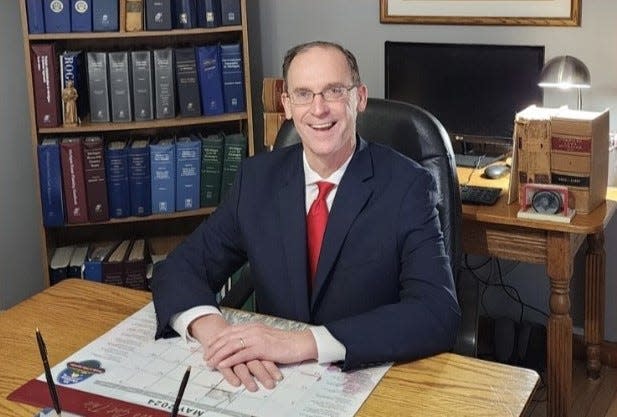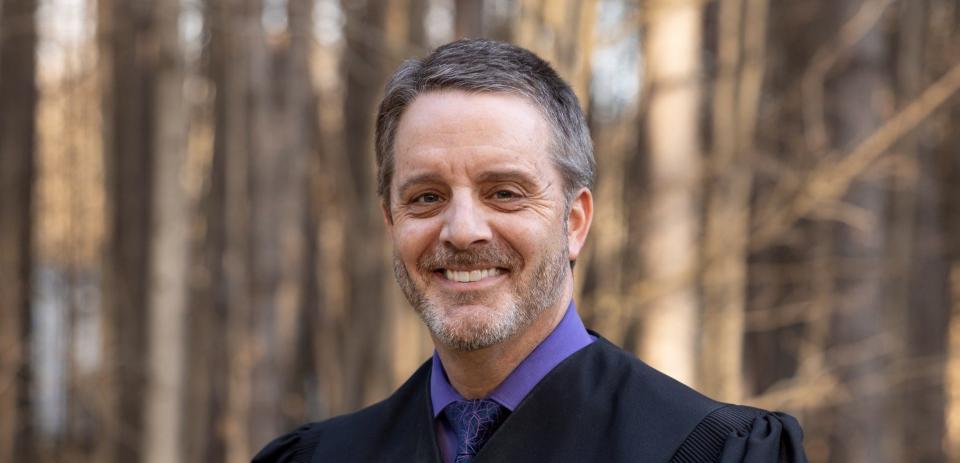Voters have four candidates to consider for next probate judge

- Oops!Something went wrong.Please try again later.
GAYLORD — Voters in the Aug. 6 primary will select one of four candidates to become the next probate judge in the 46th Circuit Court for Otsego County.
The current judge, Michael Cooper, who has served since being appointed by Gov. John Engler in 2000, is retiring. Courtney Cadotte, David Delaney, Kevin Hesselink and Paul Slough are running to replace Cooper.
The Gaylord Herald Times invited all of the candidates to respond to a series of questions selected by the paper which reserved the right to edit the responses to account for space limitations, proper use of grammar and Associated Press style guidelines.
All of the candidates responded and below are their responses to the questions presented in alphabetical order based on their last name:
Courtney Cadotte
Q: Please describe your background (educational achievements, work history and how long you have lived in the area etc.).
A: My wife and I along with our two children took a leap of faith and moved to Gaylord eight years ago so that I could work for a nonprofit, legal-aid law firm and we could raise our children in Otsego County. We love Otsego County, which has rewarded our faithful leap. My law firm provides free civil legal representation to low-income folks in landlord/tenant, debt collection, family law, small estate planning and public benefits cases.
I began my legal education in 2012 and I went to Cooley Law School at an accelerated pace, finishing in just over two years and passing Michigan's bar exam on my first attempt. While in law school in Oakland County, I took advantage of several internships in both private practice and local government work, but I was repeatedly drawn back to Detroit's nonprofit legal-aid provider at that time. Currently, I represent our circuit in the Representative Assembly of the State Bar of Michigan, where I chair the drafting committee. I also serve on the state bar's unauthorized-practice-of-law committee and previously served on the state bar's character and fitness committee for Northern Michigan and the U.P.
I can often be seen shopping for other folks' groceries in the evenings and on weekends, so that I can earn extra money to supplement my nonprofit salary. I chose not to allow my candidate committee to raise money, and I don't have extra money to purchase campaign materials. I believe that the people of Otsego County know better than to vote for candidates just because they see them on yard signs.

Q: Probate Court deals with very personal issues that could affect every resident such as the administration of estates and trusts, guardianships and conservatorships for incapacitated adults, minors and individuals with developmental disabilities. In addition, the Probate Court also hears petitions for involuntary hospitalization and treatment of persons with a mental illness. When you review these matters, what do you think are the two most important factors to consider?
A: It is important to note that our Probate Court also is assigned the District Court docket, which includes small claims, landlord/tenant, debt collection, criminal cases and other civil cases. In all things before the court, upholding the law while recognizing each person's innate dignity are paramount. To those ends, it is crucial to recognize that many people who are in court are experiencing the most difficult moments of their lives. Therefore, an attorney like myself who has engaged in numerous trainings to understand the impacts of trauma on peoples' behaviors will be an asset to the probate and district courts as a judge.
Q: Should Supreme Court Justices Samuel Alito and Clarence Thomas recuse themselves from cases involving former President Donald Trump?
A: Our Supreme Court, unlike the courts in Michigan, is not subject to any significant ethical requirements. The practical impact of this lack of oversight is that all Supreme Court justices are expected to be people of high conscience and personal integrity. I trust my fellow citizens of high conscience and personal integrity to form their own opinions as to whether these particular Supreme Court Justices are obeying their conscience and demonstrating personal integrity.
David Delaney
Q: Please describe your background (educational achievements, work history and how long you have lived in the area etc.).
A: I have been a practicing attorney for 34 years and have lived in Gaylord for the past 31 years. My legal career began with a three-year tenure as an assistant prosecutor, during which I litigated more than 100 jury trials.
For the past 31 years, my practice has centered on litigation, real estate, business law, zoning, municipal law, the Michigan Tax Tribunal, oil and gas law, lake access and probate matters. I have also had the privilege of arguing cases before the Court of Appeals and the Michigan Supreme Court.

Q: Probate Court deals with very personal issues that could affect every resident such as the administration of estates and trusts, guardianships and conservatorships for incapacitated adults, minors and individuals with developmental disabilities. In addition, the Probate Court also hears petitions for involuntary hospitalization and treatment of persons with a mental illness. When you review these matters, what do you think are the two most important factors to consider?
A: Since 1993, in my role as an attorney for the Otsego County Probate Court, I have made numerous visits to nursing homes and residences to interview elderly individuals and those suffering from mental illness or physical disabilities. I have collaborated with the Otsego County Commission on Aging, Adult Protective Services and Community Mental Health to safeguard vulnerable adults and children. The probate court has the authority to authorize guardianships to protect individuals and conservatorships to manage their finances.
The first crucial factor to address is the exploitation of the elderly. The probate court can issue orders to protect real and personal property, secure bank accounts and recover funds.
The second important consideration is the mental health treatment of individuals within the criminal justice system. The city of Gaylord is taking a leading role by hiring a law enforcement officer specifically tasked with social intervention, aiming to reduce the community's involvement with the judicial system.
Q: Should Supreme Court Justices Samuel Alito and Clarence Thomas recuse themselves from cases involving former President Donald Trump?
A: The U.S. Supreme Court is a federal court, while the Otsego County Probate Court is a state court. The rules for recusal differ between the two.
For the U.S. Supreme Court, a justice must step aside if a reasonable person would think they can’t be fair. In Michigan, a judge is generally presumed to be fair, and proving otherwise is difficult. Unless there is clear evidence of bias, a judge will not be removed.
I believe in adhering to the law, maintaining limited government, and upholding constitutional principles.
Kevin Hesselink
Q: Please describe your background (educational achievements, work history and how long you have lived in the area etc.).
A: My wife and I have spent 33 years in Gaylord. Our four children have attended and graduated from Gaylord schools, and have given us two grandchildren. We are active members of our church (E-Free), where I have taught small groups, lead music and served as church chairman. We also volunteer, including for Operation Christmas Child, Gus Macker, Big Ticket and the Circuit Court’s indigent divorce clinic.
My education includes being valedictorian of my high school class, graduating college one year early with honors with a bachelor’s degree in criminal justice from Northern Michigan University and being the top graduate from the NMU Regional Police Academy. I graduated with a law degree from Cooley Law School.

Professionally, I have experience in all of the types of cases heard by the Probate Court including criminal, civil and probate. My experience includes seven years as a judge, five years as an appointed judge in family court deciding juvenile issues and the last two years in tribal court doing the same cases as Probate Court. I also have 20 years as a prosecutor, including 10 years as the elected Otsego County prosecutor.
For 31 years I have been a legal instructor teaching constitutional, criminal and juvenile law and 15 years practicing as a private attorney focusing on criminal, family and probate cases.
Q: Probate Court deals with very personal issues that could affect every resident such as the administration of estates and trusts, guardianships and conservatorships for incapacitated adults, minors and individuals with developmental disabilities. In addition, the Probate Court also hears petitions for involuntary hospitalization and treatment of persons with a mental illness. When you review these matters, what do you think are the two most important factors to consider?
A: As a judge for many years, it has been my experience that people who come to court are looking for two things: respect and wisdom.
I have developed and use the following process to ensure that respect is shown in my courtroom. I take time at the beginning of each case, especially where attorneys are not present, to inform the parties of what the law requires and what the applicable court procedures are so that they know what to expect. This leads to a sense of dignity and worth, as well as a common understanding and realistic expectations.
During the court hearing I give each party a fair chance to voice their concerns and to “have their day in court.” To show them that they have been “heard” I summarize what they said. I have been repeatedly told that giving a party a “voice” and actually “hearing” them makes them feel as if they had a fair hearing, even if my ultimate decision was not in their favor.
Subscribe Check out our latest offers and read the local news that matters to you
At the end of the case, I make certain to explain my decision in detail so that the parties know that I have made a reasoned decision based on the law and the specific facts of the case. This gives respect to the parties by ensuring that the case is decided on the merits, not politics, prejudice or popularity.
A second factor important to Probate Court litigants is wisdom: will the judge decide their case wisely? Wisdom is not just knowledge, it is the proper application of knowledge.
Q: Should Supreme Court Justices Samuel Alito and Clarence Thomas recuse themselves from cases involving former President Donald Trump?
A: In Michigan, the reasons for disqualification of a judge include where the judge is biased or prejudiced for or against a party, the judge has a serious risk of actual bias, or the judge has failed to avoid the appearance of impropriety. These rules require a judge to observe a high standard of conduct so that the integrity and independence of the judiciary is preserved. The federal standard is somewhat similar, requiring a justice to disqualify himself in any proceeding in which his impartiality might be questioned.
As I understand it, the allegations of bias or prejudice by justices Alito and Thomas relate mostly to actions attributable to their politically active wives who support Trump. Actual bias generally requires a significant personal action or statement of the judge which shows bias or partiality, not just actions or statements of persons with whom he is associated.
However, the appearance-of-impropriety standard is more concerned with appearances than actual bias. In today’s more open-minded society, do the actions of one spouse appear to tar and feather the other spouse to the extent that professional disqualification of the other spouse is required? My view is that judges are held to a higher standard and, if there is any reasonable evidence of an appearance of impropriety, recusal should be the norm in order to protect the public trust in the judiciary.
Paul Slough
Q: Please describe your background (educational achievements, work history and how long you have lived in the area etc.).
A: I was raised on a dairy farm in Northern Michigan. After graduating from law school with honors, I returned to this area with my wife, Brandie, to raise our family. Brandie is the granddaughter of Gene and Barbara Fleming. We reside on Fleming Farm with our three children, Saige, Gabe and Claire.
I started my legal career as a law clerk for Hon. Dennis Murphy and Hon. Janet Allen. For the past 18 years I have practiced civil, criminal and probate law across Northern Michigan. In 2015, I joined Ron Kirkpatrick and Steve Dubois’ firm. I’ve handled a wide variety of cases and roles during that time. I was appointed the public administrator for the Otsego County Probate Court, with the responsibility of handling probate cases for individuals who die with no heirs. For a time I was a special assistant to the attorney general assisting adult protective services. In that role I assisted with having guardians appointed for indigent vulnerable adults. I’ve also been the attorney for the city of Gaylord as well as counsel for Chester, Elmira and Otsego Lake townships.
What distinguishes me as a candidate is both my experience as well as my demeanor and close connection with the community. I started my career researching and drafting legal opinions as a law clerk in the court. In that role I was taught to think like a judge. That carried over into my private practice, where I have volunteered as a trained mediator for 17 years. The skills that are taught to a mediator are the same skills you want in a judge: someone who listens, remains impartial and helps resolve cases. I have mediated numerous district and probate court matters.
Q: Probate Court deals with very personal issues that could affect every resident such as the administration of estates and trusts, guardianships and conservatorships for incapacitated adults, minors and individuals with developmental disabilities. In addition, the Probate Court also hears petitions for involuntary hospitalization and treatment of persons with a mental illness. When you review these matters, what do you think are the two most important factors to consider?
A: My highest priority will be the protection of the parties’ rights. This includes the right to be heard, the right to a fair hearing and the right to understand the court’s actions. In many probate cases the protected individual cannot effectively understand or communicate with the court (e.g. a young child or incapacitated person). In those circumstances, I will ensure a representative is appointed who will carefully investigate the facts and vigorously advocate for the protected individual. I will always hold that representative accountable.
The second consideration is the prompt and diligent administration of the case because justice delayed is justice denied. A judge must keep cases moving toward a resolution. In no case is that more important than in those involving the abuse or neglect of a child. An unnecessarily lengthy proceeding further harms the child. Childhood lasts only a few precious years; for that reason, resolving those cases promptly and correctly is imperative.
Prompt resolution and good administration is also important in the District Court. I look forward to working with court staff, attorneys and litigants to make improvements to both courts, including a review of how we can run the dockets more efficiently.
Q: Should Supreme Court Justices Samuel Alito and Clarence Thomas recuse themselves from cases involving former President Donald Trump?
A: Recusal is required when a judge cannot be impartial. This can be because of bias toward a party, or a personal interest in the outcome of the case. In federal courts, these disqualification standards are codified in a federal law passed by Congress.
In each case, justices Alito and Thomas must personally decide whether they can be impartial and comply with the federal law. The influence of politics on the courts is nothing new. The lifetime appointment of federal judges was intended to insulate them from partisan political pressure, checked by the ability of Congress to impeach. This framework was carefully considered by our Forefathers and has served us for nearly 250 years through bitter partisan divides, including a civil war. Just in the past few months, we’ve seen multiple decisions from the Supreme Court reflecting disagreement between justices who were supported by the same political party. In many other cases, decisions have been unanimous. I have faith in the framework provided for in the Constitution by our Forefathers.
If honored with the opportunity to serve as judge, I will hold myself to the highest standards. The position demands honesty, integrity and a serious demeanor. I will work hard to avoid even the appearance of impropriety. I will always treat every participant with courtesy and respect, both inside and outside the courtroom.
— Contact Paul Welitzkin at pwelitzkin@gaylordheraldtimes.com.
This article originally appeared on The Petoskey News-Review: Otsego County voters have four candidates to consider for next probate judge

